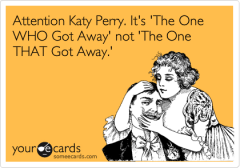By Gini Dietrich
As more and more organizations join the owned media way of marketing, the grammar police seem to be in greater force.
Poor Sam Fiorella. Every time he writes something, he asks three or four of us to make sure he isn’t going to be crucified by the grammar police. It’s become quite comical and we enjoy giving him a hard time about it.
But he’s not alone. Many business leaders stress about writing anything at all, for fear of having incorrect grammar that will be made fun of across the web.
Between not knowing correct grammar and the text lexicon, it’s no wonder people are fearful of not just writing, but publishing, their work.
While I am certainly no Grammar Girl, I have found there are mistakes nearly everyone makes, particularly when writing for the web.
All Hail the Grammar Police!
- Affect vs. effect. The easiest way to remember the difference between the two is affect means “to influence.” So if you’re going to influence something, you will have an affect. If it’s the result of something, it’s an effect.
- The Oxford comma. In a series of three or more terms, you should use what’s referred to as the Oxford comma. This means you should have a comma before the word “and” in a list. For instance: The American flag is red, white, and blue. Many people debate this, but I’m a believer in it because there are times when you don’t have the extra comma and the sentence doesn’t make sense. I prefer to err on the side of having the Oxford in there.
- Commas, in general. And speaking of commas, slow down when you’re writing and read your copy out loud. You don’t want to make this mistake: Let’s eat grandma vs. let’s eat, grandma. Poor grandma will be eaten if you forget the comma.
- Their, they’re, and there. You’d think everyone learned this rule in fourth grade, but it’s a very common mistake. Use “there” when referring to a location, “their” to indication possession, and “they’re” when you mean to say “they are.”
- Care less. The dismissive “I could care less” you hear all the time is incorrect. If you could care less, that means there is more you could care less about the topic. Most people omit the “not” in that phrase. It should be, “I couldn’t care less.”
- Irregardless. This word doesn’t exist. It should be regardless.
- Nauseous. How many times have you said you felt nauseous? This is incorrect. You feel nauseated. Nauseous means something is sickening to contemplate.
- Your and you’re. Another mistake you see in people’s social media profiles and in the content they create is not correctly using “your” and “you’re.” If you’re meaning to say “you are,” the correct word is “you’re” (like at the beginning of this sentence). Otherwise the word is “your.”
- Fewer vs. less. Another common mistake, “less” refers to quantity and “fewer” to a number. For instance, Facebook has fewer than 5,000 employees.
- Quotation marks. Among great debate, people ask all the time whether or not punctuation belongs inside or outside quotation marks. It belongs inside.
- More than vs. over. I’m pretty sure the advertising agency created this grammatical error. Instead of saying, “We had more than 50 percent growth” in ad copy, “over” allows for more space. So they say, “We had over 50 percent growth.” Drives. Me. Crazy.
- Me vs. I. I was reading something by a big muckety muck the other day and the copy read, “This year has brought a big personal development for my wife and I…” No, no, no! If you were going to say that without the mention of your wife, you wouldn’t say, “This year has brought a big personal development for I.” You would say “me.” So this year has brought a big personal development for my wife and me.
There are so many grammar mistakes made today, The Elements of Style is on its fourth edition. Also check out the AP Stylebook. While most business writers don’t abide by those rules, most PR professionals do.
Having a copy of both (and referring to them) and asking an editor for help (even if it’s informal like Sam does), you’ll never have to worry about the grammar police.
